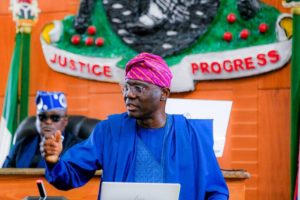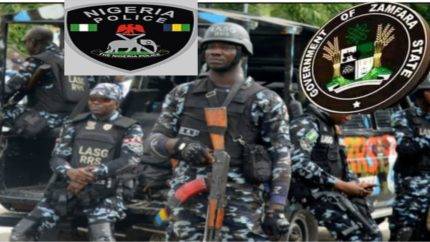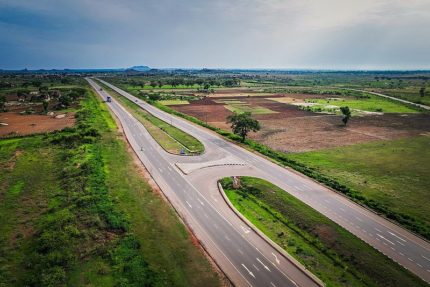The Federal Government of Nigeria has taken a significant step towards the completion of the long-delayed Abuja-Kano highway by allocating a total of N280 billion to Julius Berger Construction Company. The announcement was made by the Minister of Works, Senator David Umahi, who revealed that the funds will be disbursed over a period of 14 months, with N20 billion being released each month. This financial commitment is expected to expedite the completion of the 82 km segment of the highway, a critical infrastructure project that has faced numerous delays due to funding constraints.
During a meeting held to review ongoing road projects, Senator Umahi emphasized the importance of the Abuja-Kano highway, which serves as a major transportation artery in Nigeria. He acknowledged the challenges posed by limited financial resources but expressed confidence that the steady flow of funds to Julius Berger would ensure the timely completion of the project. The minister’s statement underscores the Federal Government’s of Nigeria renewed focus on infrastructure development as a key component of its economic recovery and growth agenda.
Government’s Strategic Focus on Key Road Projects
In addition to the Abuja-Kano highway, the Federal Government of Nigeria is prioritizing several other major road projects across the country. According to a statement released by the Minister’s media team, these projects include the Abuja-Kaduna-Zaria-Kano route, the second phase of the Lagos-Ibadan expressway, the Second Niger Bridge, and key bridges in Lagos, such as the Third Mainland Bridge, Iddo, and Carter Bridges. These projects, many of which have been delayed due to financial challenges, are now receiving renewed attention under the “Renewed Hope” administration.
Minister Orji Uchenna Orji, speaking on behalf of Senator Umahi, highlighted the importance of completing these projects to alleviate the suffering of road users, particularly during these economically challenging times. The Federal Executive Council has directed that all inherited and new projects, especially those handled by multinational companies like Julius Berger, be appraised and restructured to ensure their completion. This strategic focus on infrastructure is seen as a crucial step in addressing the nation’s transportation needs and boosting economic activities.
Accelerating Progress on the Abuja-Kaduna-Zaria-Kano Road
The Abuja-Kaduna-Zaria-Kano road, a key segment of the country’s road network, has also been a focal point of the Nigeria government’s infrastructure agenda. During his assessment of the ongoing works, Senator Umahi commended Julius Berger for the quality of their work on the project. However, he issued a directive to the company to focus on completing one carriageway at a time and to fill both carriageways with stone base and level them within three weeks to ease the current hardships faced by road users.
The minister also outlined a timeline for the completion of the project within the next 14 months, with the work to be executed in four sections. To ensure that the project stays on track, the Federal Government of Nigeria has committed to making monthly payments of N20 billion to Julius Berger. This financial arrangement is expected to expedite the construction process and bring much-needed relief to commuters who have long endured delays and disruptions on this critical route. The successful completion of the Abuja-Kano highway is anticipated to significantly improve transportation links between the capital city and the northern regions, fostering economic growth and development.
The Importance of the Abuja-Kaduna-Zaria-Kano Highway: A Vital Artery for Nigeria’s Economy and Unity
The Abuja-Kaduna-Zaria-Kano highway, spanning 375.9 kilometers, is a critical transportation artery that connects Nigeria’s capital city to major commercial and industrial centers in the northern region. This highway is not just a road; it is a lifeline that supports the country’s economy and fosters national unity. The road’s significance extends beyond mere connectivity, as it plays a pivotal role in the movement of people and goods across several states and local governments, ensuring the seamless flow of commerce and contributing to the nation’s overall development.
A Crucial Economic Link
The Abuja-Kaduna-Zaria-Kano highway is one of Nigeria’s most important highways, forming a key part of the larger North-South transportation network. This road facilitates the movement of people and products from the North to the South and vice versa, making it indispensable for trade and commerce. The high traffic volume on this highway is a testament to its importance, as it serves as the main conduit for the transportation of goods, including agricultural products, raw materials, and manufactured goods. This highway is not only vital for local trade but also plays a significant role in international commerce, as it connects Nigeria to North Africa via the Lagos-Algiers Trans-African Highway.
The economic impact of this highway cannot be overstated. By enabling the efficient transportation of goods, it helps to reduce the cost of logistics and enhances the competitiveness of Nigerian businesses. Furthermore, the highway supports the economic activities of the numerous local governments it traverses, providing a boost to local economies and contributing to job creation. The Abuja-Kaduna-Zaria-Kano highway is therefore not just a road but an essential economic lifeline that drives growth and prosperity in Nigeria.
Uniting Nigeria and Enhancing Regional Integration
Beyond its economic significance, the Abuja-Kaduna-Zaria-Kano highway plays a crucial role in uniting the Nigerian people and fostering national unity. As a major transportation route that connects the northern region to the southern part of the country, this highway facilitates the movement of people, thereby promoting social integration and cultural exchange. The road serves as a bridge that links different regions and communities, enabling Nigerians from diverse backgrounds to interact, trade, and build relationships. This interaction is vital for national cohesion, as it helps to break down regional barriers and fosters a sense of unity among the populace.
Moreover, the highway’s connection to the Lagos-Algiers Trans-African Highway highlights its importance in enhancing regional integration. By linking Nigeria to North Africa, the road facilitates the movement of goods and people across borders, promoting trade and cooperation between African countries. This regional connectivity is crucial for the implementation of the African Continental Free Trade Area (AfCFTA), which aims to create a single market for goods and services across the continent. The Abuja-Kaduna-Zaria-Kano highway is therefore not just a national asset but also a key component of Africa’s infrastructure network, contributing to the continent’s economic integration and development.
The Abuja-Kaduna-Zaria-Kano highway is a vital transportation artery that plays a significant role in Nigeria’s economy and unity. Its importance extends beyond the movement of people and goods, as it fosters national cohesion and enhances regional integration. As Nigeria continues to develop and modernize its infrastructure, the Abuja-Kaduna-Zaria-Kano highway will remain a critical asset that supports the country’s growth and prosperity.
Table of Contents
Discover more from OGM News NG
Subscribe to get the latest posts sent to your email.














